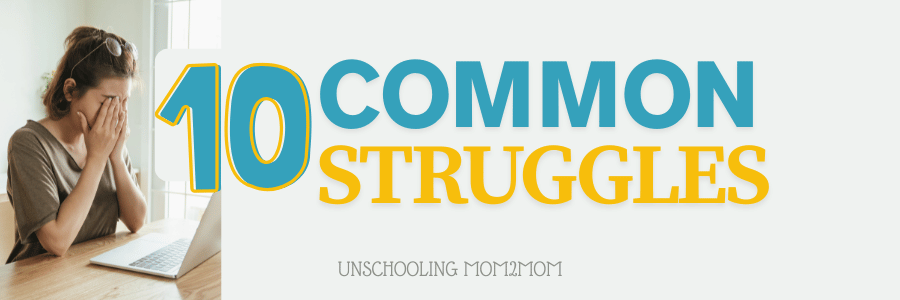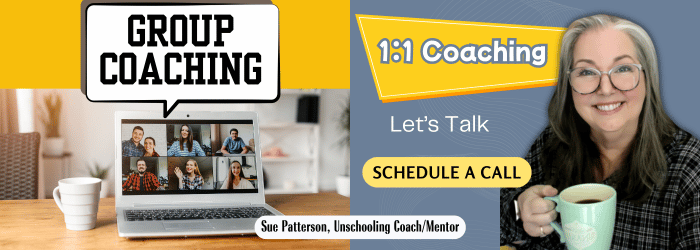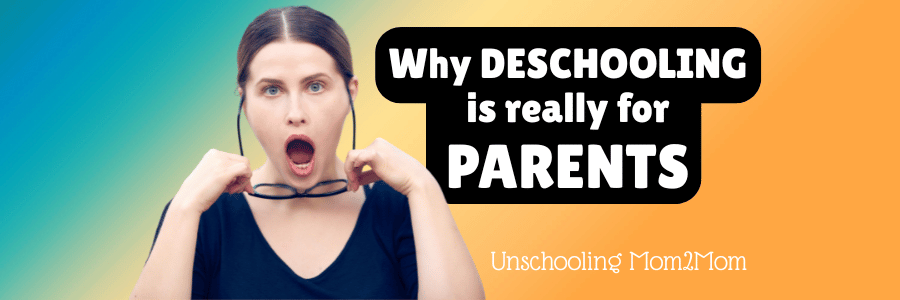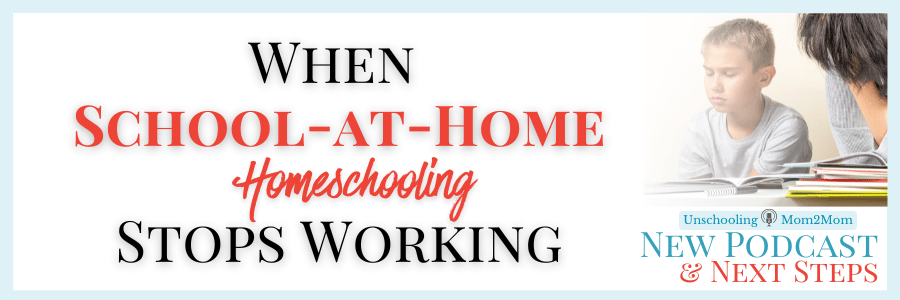From Doubt to Confidence: 10 Unschooling Struggles You Can Overcome
Listen or Watch
FREE Unschooling Guide!
Dive Deeper with links to resources for each struggle in this free PDF waiting for you!

If you’re unschooling, or even just thinking about it, you might be feeling like...
You’re just not doing it right.
Like maybe
your kid is too different, too resistant, too “behind.”
Like maybe you don’t have what it takes.
Or you don’t have anyone to bounce ideas off of—no one in your corner saying,
“Yep. That’s normal. You’re doing just fine.”
That feeling? It’s not just you.
That’s how MOST of us feel when we first step off the school conveyor belt.
We know—deep down—that we
don’t want the one-size-fits-all approach anymore.
We
want something more individualized. More human.
We want to center the
learner, not recreate a school-at-home setup where we become the teacher and our kid becomes the reluctant student.
But even when we know all that… the fear still creeps in.
And on some days? It wrestles the steering wheel right out of our hands.
So today, I want to walk you through 10 common struggles unschooling parents face—because just naming them can be such a relief. I want to show you just how normal all of this is. And how much smoother things can feel when you stop blaming yourself and start getting the support you need.
Let’s get into it.
1. Fear of Academic Gaps
"What if they never learn math?”
Parents worry their child will miss critical subjects or fall behind peers in traditional schools.
It’s a hard mindset shift from “coverage” to “curiosity.” But you can do it!
We’re so used to thinking learning has to follow a set path and timeline. But unschooling doesn’t do school with less structure—it does life with more trust. We know more about brains than we did back in the day. And we know that humans are curious beings. Curiosity fills those gaps—and it sticks way better than memorized facts ever did. Think of how many years you endured subjects that aren’t showing up in your real life. And if they did, you could google it, or watch a Youtube video. You could fill that gap really quickly. I know, this is a hard one to get past - and it may take you a little while to look at it all closely and accurately. But much of the information we were told we’d need - we didn’t. And those things we need, we remember and use them. That’s what happens when you live in the real world. Your kids aren’t living in the Land of the Arbitrary Expectations called school... they’re right here in Real Life with you.
More Here...
Podcast #94: Unschooling & Your Fear about Educational Gaps
Blogpost: What about Learning Gaps?
2. Comparison to Traditional Schoolers
“If I’m not managing their learning, am I being irresponsible?"
School teaches us to plan, assign, and evaluate. Unschooling asks us to collaborate, trust, and partner with them—often before we fully know how.
Sometimes the problem is that we’re still measuring their worth based on comparing and competing. We may SAY we don’t like that school does that so much - but maybe you’re doing it without even realizing it.
Your niece is reading chapter books. Your neighbor’s kid is starting Algebra class.
And meanwhile your kid is building Minecraft villages and watching nature documentaries.
Comparison is a joy-stealer. Your child is learning all the time—it just not going to look like what you
expected.It’s not going to look familiar. But learning is happening.
More Here...
YouTube Video: 4 Reasons Parents Struggle with Comparisons and Competition
3. Pressure from Family and Friends
“Aren’t you ruining their future?”
Even the most well-meaning people can plant seeds of doubt. It’s hard to stay confident when you’re constantly defending your choices.
You get questions: “Is that even legal?”
“What about college?”
Pressure from Family and friends can wear you out. It’s exhausting to constantly justify yourself. Especially when people you love are questioning your choices. We feel more comfortable when everyone in our circle is in sync. But that’s just familiarity - not necessarily what’s best for you or your child. You don’t owe them a explanation. They don’t get a vote. You’re building a life that works for your family—and that takes courage, not explanations.
More Here...
Podcast/Blogpost:
Understanding Criticism from Friends/Family
4. Letting Go of Control
“Their cousin just aced the SAT. Should we be doing something more structured?”
Unschooling doesn’t come with tidy benchmarks, so it’s easy to feel like you’re falling short when comparing to conventional timelines.
Most of us were raised to believe that learning requires a teacher, a plan, and a set of outcomes. So when unschooling invites us to trust, observe, and partner—it can feel... unmoored.
You’re not “doing nothing.” You’re stepping
beside your child, not in front of them. You’re helping them learn the skills to know who they are and how to navigate their way in the world. Learning how to individualize means that you you’re spending a lot more time observing - instead of trying to fit them into a box or trying to sparkle up the standardized curriculum.
More Here...
Podcast/Blogpost: Unschooling, Teaching, Learning
Podcast/Blogpost: Unschooling Parent Worries: “What If I Fail?”
5. Old School Baggage
“It’s hard not to revert back to what I grew up with.”
Traditional classroom methods shaped our thoughts about learning. When unschooling feels unfamiliar or wobbly, it’s easy to slip back into assigning, correcting, and controlling.
This struggle is more internal. But don't beat yourself up—you’re breaking a pattern. Replacing old school habits with trust-based parenting takes time. Every moment you pause and choose connection over control is a step in the right direction.
We can be our own worst enemy, our own harshest critic, right?
You say you trust your child, you WANT to trust your child, but deep down...you have doubts.
You’re still checking boxes.
Still watching the clock. Still panicking about benchmarks.
This isn’t a character flaw—it’s conditioning. You spent a lot of years in school. It was a one-size-fits-all approach that really only aimed for the top of the Bell Curve. That’s why we talk a lot in the unschooling communities about deschooling. It’s where we start to unwind that. And, just a sidenote. It’s not something we really finish. New milestones, new situations bring in new worries. What was no big deal when they’re 7 feels so much bigger when they’re 12 or 13. I just want you to realize that undoing all the conditioning can’t be done in those first few weeks. It’s really an ongoing thing - sometimes more pressing, sometimes less so.
More Here...
Podcast/Blogpost:
I Went to School and I’m Fine!
Unschooling Guide: Deschooling
6. No Clear Framework
“Am I doing it right?”
With no curriculum or roadmap, parents can feel like they’re floating—or flailing—without structure or milestones to track.
Without a curriculum, some days feel aimless.
You might ask,
“Am I doing enough? Should I be more structured?”
Unschooling isn’t about chaos—it’s about connection. And sometimes, the framework shows up
after the fact, in hindsight. You start seeing how much they’re learning, even when it felt like “just a normal day.” You can’t see all that dot connection while you’re in it - but when you take a minute to look back, it starts to reveal itself more.
More Here...
Podcast/Blogpost:
Unschooling: Real Life Curriculum
Podcast/Blogpost: Structure & Schedules
7. Overscheduling or Overcompensating
“I bought 10 workbooks, a science kit, and a grammar app. Why won’t they use any of it?”
In a panic, parents may recreate school at home or overschedule with "educational" materials instead of following the child’s lead.
Sometimes we panic and buy All The Things—science kits, apps, subscriptions—thinking we can “cover” everything. We sign them up for camps and classes when they have the slightest interest. I’m not saying, DON”T do these things, but notice what’s happening, what the motivation is. Overscheduling can sometimes be overcompensating for something we haven’t worked through yet. Maybe we have little voices in our heads saying they need to be in room with other kids their age, or maybe it’s more about feeling relieved and happy to let some other system shoulder the load here. Sometimes moms seem to think they have bragging rights for a packed schedule or a busy kid. Unschooling isn’t about stuffing their schedule. It’s about trusting that interests will emerge... and when they do, you’ll be ready to support them. You may just need to unpack why you’re leaning toward filling up that calendar.
More Here...
Podcast/Blogpost:
I Went to School and I’m Fine!
Unschooling Guide: Am I Doing Enough?
8. The Decompression Phase
“All they want to do is play video games.”
Some kids decompress for weeks—or months—after leaving school. That natural decompression can feel like a red flag if parents aren’t prepared for it. Sometimes kids resist feeling measured and manipulated - understandably.
Especially after school or strict homeschooling, kids often collapse into what looks like laziness.
Lots of screentime, staying up late, rejecting anything with a whiff of being “educational.”
But this isn’t regression—it’s recovery. Give them time.
You’ll be amazed at what bubbles up when the pressure melts away. And it may take a little - don’t expect them to change just because you’re changing. They may need a little while to see if you really mean what you say. I always tell my coaching group that your job is to
learn how to deschool - and their job is learn how to manage all this freedom. This can be a messy path - for both parents and kids. But you’re moving in the right direction - more connection, more relevant learning, more partnership.
More Here...
Podcast/Blogpost:
Lacking Motivation
9. Loneliness
“None of my friends understand what we’re doing.”
Without a supportive community or mentors, it’s easy to second-guess, retreat, or feel like you're the only one doing this “weird” thing.
Maybe your friends don’t get it. Maybe the local homeschool group is too academic or rigid.
It can feel like you’re the only one in this wilderness.
But you’re
not. There are other families doing this too. And finding them makes all the difference.
Luckily, we have a lot of online options. And we have a wonderful collection of unschooling parents - all at different points along the path - in my
Creating Confidence Membership Group. You can come for a month - or stay for the support! The group has existed since 2016 and we’re here to support you on this journey you’re on.
More Here...
Private Unschooling Support Group:
Creating Confidence Membership
10. Fear About the Future
“Will they be able to get into college? Get a job? Be successful?”
The long-term unknowns can weigh heavily—especially when society praises productivity, credentials, and conformity
This one is big. But the truth is, unschooling creates resourceful, curious, adaptable people.
People who know how to learn, how to solve problems, and how to advocate for themselves.
That’s the real future prep. School conditioned us to always look toward the future - never really living in the moment. So it’s not surprising that we still do this. Plus, as parents, we’re not always confident that we know what we’re doing. Especially if we step off the beaten path a little bit. But conquering fear is all about pulling each fear out into the light and examining it. One at a time. I have a lot of tools that can help you - from Ebooks and Guides to courses - whatever works best for you to tackle those fears.
More Here...
Podcast/Blogpost: Getting into College
Unschooling Mom2Mom Course:
Your Unschooling Teen's
Transcripts
Any of these sound familiar?
Please know that you’re not broken. Your kid’s not broken.
You’re just in the middle of figuring out a better way.
You can do this. Alone or with others.
Honestly, most people are successful at unschooling when they have a handful of others who support their ideas or brainstorm with them. If you could use some help sorting through these fears—or just want someone to talk it through with—you can set up a private coaching call with me. We’ll look at your specific situation and I’ll help you find your footing.
Or, if you’re ready for ongoing support,
come join the Creating Confidence Membership group. Inside, we’ve got resources, conversation, coaching calls, and encouragement from people who
get it—because they’re living it, just like you.












